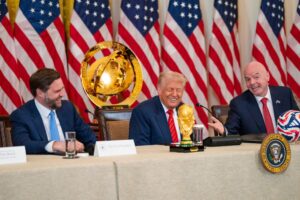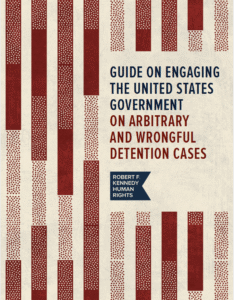(August 31, 2016 | Washington DC) Robert F. Kennedy Human Rights urges the Venezuelan government to ensure the protection and safety of the people participating in a peaceful protest to be held September 1st in Caracas, including the safety of journalists who will cover this public demonstration. Likewise, it expresses its concern over the arbitrary detention of Yon Goicochea, the transfer to prison of Daniel Ceballos and the raid by the Bolivarian National Intelligence Service (SEBIN) of Lester Toledo’s residence, who are all leaders of the opposition in Venezuela.
The peaceful march, which is scheduled for September 1st and is expected to have thousands of participants, was organized by the opposition. Under the name “Takeover of Caracas,” participants in the demonstration will march to demand that the government hold the recall referendum before the end of 2016 and allow international humanitarian aid to address Venezuela’s current food and health crisis.
“The right to peaceful assembly is key to democracy as it is a platform for all citizens to express their demands to the government,” Kerry Kennedy, President of Robert F. Kennedy Human Rights, stated. “The Venezuelan government should not only refrain from limiting this right, but must take positive action to ensure and protect it, both from interference by third parties and from excessive use of force by its own security agents.”
A few days before the peaceful demonstration, the government has increased its acts of repression against members of the opposition and political dissidents – a clear attempt to send an intimidating message to the Venezuelan people. At around 3AM on August 27, political leader Daniel Ceballos, who was at his home under house arrest, was transferred to the prison “26 de julio” in San Juan de los Morros. Likewise, on August 28 at 10PM SEBIN agents raided the home of political leader Lester Toledo without a warrant. Further, on August 29, opposition leader Yon Goicochea was arbitrarily detained without allowing him access to either his lawyers or his family.
Democracy and the rule of law in Venezuela have deteriorated significantly in recent years. In 2014 there were a series of mass protests across the country that were violently repressed and which resulted in the arbitrary detention of more than 3,500 people. Instead of taking measures to prevent such incidents and guaranteeing secure conditions for demonstrators’ full exercise of their rights to freedom of expression and association, the Venezuelan ministry of Defense adopted a resolution on January 27, 2015 that established a new model of controlling the public order. The new model allows “the use of potentially lethal force, along with the firearm or other potentially deadly weapon” as a last resort “to prevent disturbances, support the legitimately-constituted authority and oppose any attacks, facing them immediately and by any means necessary.”
“International law and the Venezuelan Constitution clearly establish the role of law enforcement in the context of public demonstrations,” said Angelita Baeyens, Programs Director of RFK Partners for Human Rights. “Law enforcement’s role is not to repress or attack those who exercise their fundamental right to peaceful demonstration but to protect them from any interference by third parties in the exercise of these freedoms.”
Robert F. Kennedy Human Rights reminds the Venezuelan Government of its international obligations and stresses in particular its duty to ensure the full exercise of political rights and the freedoms of expression and association of the Venezuelan people.




